-
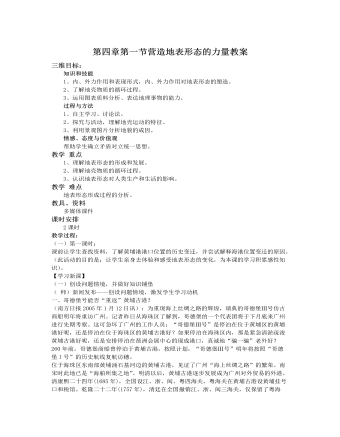
人教版高中地理必修1第四章第一节营造地表形态的力量教案
晶晶和亮亮是两滴岩浆,他们生活在地球内部的:岩浆之家。一天,他们得到批准,与其他同伴一起到地球表面进行旅行。他们飞快地奔向地表,半路上,晶晶觉得累了,于是就与亮亮约好,在地表汇合。亮亮没有停步,与其他伙伴一起跳出地表,并沿着山坡往低处流动。忽然,亮亮发现自己不能再动了,不禁问旁边的同伴这是怎么一回事。同伴笑着说:“别担心,只不过你已经不再是岩浆罢了。”问题1、为什么同伴说亮亮已经不再是一滴岩浆了?2、你认为亮亮还可以继续他的地表旅行吗?请说明原因。(由学生讨论回答。)过了好长的一段时间,亮亮发现自己的个头变小了,并随着风和流水往前运动了。亮亮边走边欣赏着地表美丽的风光。忽然,亮亮发现一个熟悉的身影,认真一看,原来是晶晶。亮亮惊讶地问:“你是怎么来到地表的?”3、请你简要推测晶晶到达地表的过程。(由学生讨论回答。)亮亮和晶晶又一起踏上旅程。
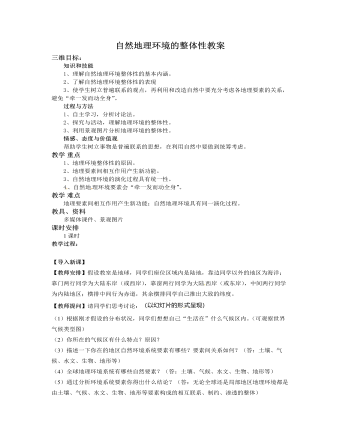
人教版高中地理必修1自然地理环境的整体性教案
1.生产功能:合成有机物的能力2.平衡功能:使自然地理要素的性质保持稳定的能力【教师讲解】生产功能主要依赖于光合作用。在光合作用过程中,植物提供叶绿素,大气提供热量和二氧化碳,土壤及水圈、岩石圈提供水分及无机盐。光合作用通过物质和能量的交换,将生物、大气、水、土壤、岩石等地理要素统一在一起,在一定的条件下,生产出有机物。由此可见,生产功能是自然环境的整体功能而非单个地理要素的功能。大气本身不具有减缓二氧化碳增加的功能,但是,在自然地理环境中,通过各地理要素的相互作用,却能消除部分新增的二氧化碳的能力,既为自然地理环境的平衡功能。请大家阅读教材P94活动,利用平衡功能的原理,解释一定范围内各物种的数量基本恒定这一现象。【学生讨论回答】略。(可参考教参)【转折】自然地理环境各要素每时每刻都在演化,如我们熟知的气候变化、地貌变化等。各个要素的发展演化是统一的,一个要素的演化伴随着其他各个要素的演化。
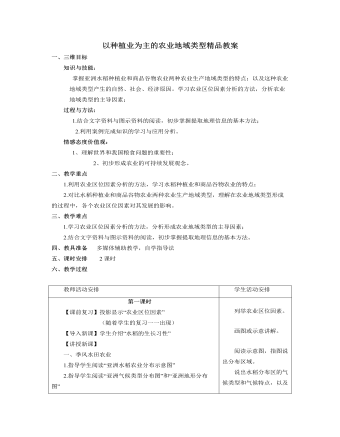
人教版高中地理必修2以种植业为主的农业地域类型精品教案
知识与技能:掌握亚洲水稻种植业和商品谷物农业两种农业生产地域类型的特点;以及这种农业地域类型产生的自然、社会、经济原因。学习农业区位因素分析的方法,分析农业地域类型的主导因素;过程与方法:1.结合文字资料与图示资料的阅读,初步掌握提取地理信息的基本方法;2.利用案例完成知识的学习与应用分析。情感态度价值观:1、理解世界和我国粮食问题的重要性;2、初步形成农业的可持续发展观念。二、教学重点1.利用农业区位因素分析的方法,学习水稻种植业和商品谷物农业的特点;2.对比水稻种植业和商品谷物农业两种农业生产地域类型,理解在农业地域类型形成的过程中,各个农业区位因素对其发展的影响。三、教学难点1.学习农业区位因素分析的方法,分析形成农业地域类型的主导因素;2.结合文字资料与图示资料的阅读,初步掌握提取地理信息的基本方法。
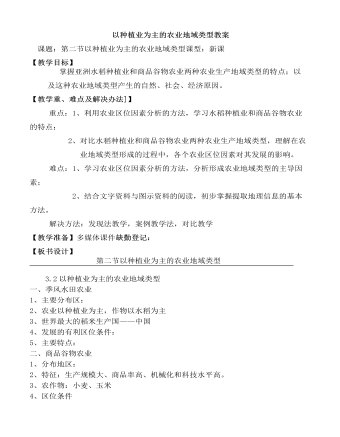
人教版高中地理必修2以种植业为主的农业地域类型教案
1.指导学生阅读“亚洲水稻农业分布示意图”2.指导学生阅读“亚洲气候类型分布图”和“亚洲地形分布图”3.指导学生阅读“亚洲人口分布图”4.提示学生思考:世界主要粮食作物有哪些?水稻种植对气候和土地的要求是什么?东南亚的气候和地形还适宜其他农作物生长吗,为什么不选择?水稻种植对劳动力数量有什么要求?5.引导学生总结本区农业生产的特点。6.引导学生总结季风水田农业的区位因素。7.提醒学生思考:“农业区位的主导因素是自然因素还是社会因素?通过对比商品谷物农业来总结。”(过渡)。列举农业区位因素。画图或示意讲解。阅读示意图,指图说出分布区域。说出水稻分布区的气候类型和气候特点,以及地形特征。说出水稻分布区的人口分布特征。思考并回答问题。列举本区农业生产的特点。列举本区农业生产的区位因素。
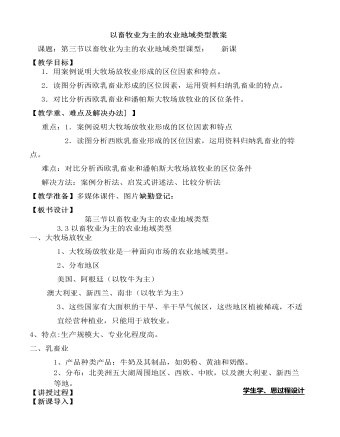
人教版高中地理必修2以畜牧业为主的农业地域类型教案
提问:阿根廷牧牛业以肉牛为主,那除肉牛以外还有哪种类型的牛呢?(奶牛)引入乳畜业。下面我们就来学习乳畜业。板书:二、乳畜业讲述:乳畜业随着城市发展而形成的面向城市市场的商品化、集约化畜牧业地域类型,其生产对像主要是奶牛。活动:请大家阅读52-53面内容,思考下列问题:提问:1、乳畜业产品有哪些?(牛奶及其制品)2、乳畜业主要分布在哪些地区呢?3、乳畜业是靠近消费市场好还是远离市场好?为什么?板书:1、产品种类产品:牛奶及其制品,如奶粉、黄油和奶酪。2、分布:北美洲五大湖周围地区、西欧、中欧,以及澳大利亚、新西兰等地。3、多紧邻消费市场(由于牛奶及大部分乳制品不耐贮藏,且运输不便)目前,世界上许多大城市都有奶牛农场分布于市郊。我国北京、上海等大城市周围也发展了乳畜业。活动:第53面及第54面的活动题。

人教版高中地理必修2如何看待农民工现象精品教案
尽管如此,农民工作为一个新的社会阶层,其独特的经济需求和政治诉求应该得到充分的尊重。虽然农民工的“根”还在农村,但是他们已经脱胎换骨,日益成长为一个迫切需要社会认可的新兴阶层。3.农民工处于何种生存境况?作为“廉价劳动力”,工资水平低,拖欠时有发生。作为“超时劳动力”,工作时间极长,超负荷从事繁重工作。作为“高危劳动力”,社会保障缺失,各种安全事故频繁。4.农民工问题有多么重要?农民工问题关系到农业增效、农民增收和农村繁荣。农民工问题关系到工业化、城镇化和“以工补农、以城促乡”。农民工问题关系到社会主义和谐社会建设。5.解决农民工问题应该做些什么?构建城乡一体化就业体系。健全农民工权益保障制度。强化农民工输出地和输入地培训。稳妥解决农民工户籍问题。改进对农民工的管理和服务。
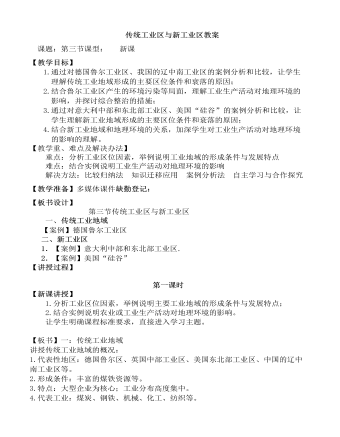
人教版高中地理必修2传统工业区与新工业区教案
1.通过对德国鲁尔工业区、我国的辽中南工业区的案例分析和比较,让学生理解传统工业地域形成的主要区位条件和衰落的原因;2.结合鲁尔工业区产生的环境污染等局面,理解工业生产活动对地理环境的影响,并探讨综合整治的措施;3.通过对意大利中部和东北部工业区、美国“硅谷”的案例分析和比较,让学生理解新工业地域形成的主要区位条件和衰落的原因;4.结合新工业地域和地理环境的关系,加深学生对工业生产活动对地理环境的影响的理解。【教学重、难点及解决办法】重点:分析工业区位因素,举例说明工业地域的形成条件与发展特点难点:结合实例说明工业生产活动对地理环境的影响解决方法:比较归纳法 知识迁移应用 案例分析法 自主学习与合作探究 【教学准备】多媒体课件缺勤登记:
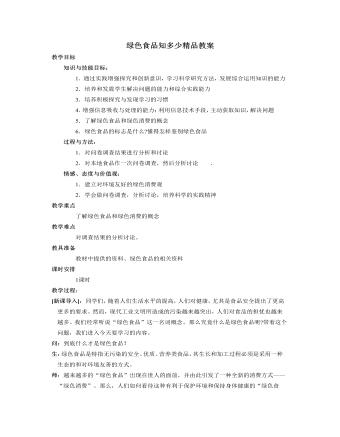
人教版高中地理必修2绿色食品知多少精品教案
生1:加强对绿色食品的宣传和扶持力度。当前的形势迫切要求我们发展绿色食品,因为绿色食品是真正实现可持续发展的,做到了发展经济和环境保护相结合,而且有利于增进人民身体健康。但目前绿色食品在市场上难成气候,主要是宣传和扶持不够。生2:绿色食品对环境、生长过程、加工过程以及运输等过程都有很严格的要求,很多环境相对优良的地区都是边远落后地区,必须给予政策上的扶持和优惠,才能降低成本,市场发展前景才会更加广阔。活动与探究对当地绿色食品市场情况作调查并初步分析。活动的实施过程:1.确定调查研究的目标并制定调查研究的计划。市场调查要深入广大消费者,可以去市场上做调查,‘对象包括消费者和经营者。形式可以是问卷,也可以是现场采访。弄清楚被调查者对绿色食品的态度,是否了解食用绿色食品的意义,是否懂得鉴别绿色食品等。对象力求涉及各个年龄段,多种职业。2.对问卷调查进行整理、分析,得出结论。

人教版高中地理必修2传统工业区与新工业区精品教案
③在萨斯索罗地区集聚的相关企业和服务性机构有哪些?④萨斯索罗瓷砖工业小区的生产—销售—服务网络中支撑企业、辅助性企业、服务性企业、服务性机构有哪些?学生回答问题后教师小结:意大利的新工业区,以中小企业集聚的工业小区为独特的发展模式。工业小区的优势是有助于加强专业化,提高生产效率,降低生产成本,增强在市场上的竞争力。完成课本70页活动:1. 比较温州乡镇企业与意大利新工业区的发展有什么异同(相同:有大批廉价劳动力,企业规模小,以轻工业为主,企业生产高度专业化,资本集中程度低。不同:最大的不同是意大利工业小区密切联系协作,共同形成巨型企业,温州虽生产同种产品,但是联系协作不如意,形成多家企业竞争局面,规模效应大减。)2. 温州乡镇企业的发展有哪些些问题?你能为其解决这些问题提出合理化的建议吗?(加大技术投入,企业间联系协作,杜绝恶性竞争等)
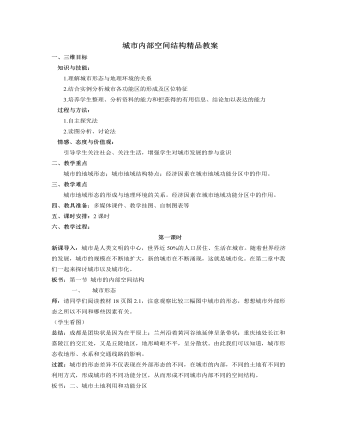
人教版高中地理必修2城市内部空间结构精品教案
过渡:在实际生活中,城市内部空间结构并非完全按照这一经济规律呈现,而是更具复杂性。这说明除了经济因素外,还有很多其他因素在起作用,请大家结合你的认识、图2.9和案例1:纽约市的少数民族区谈谈你的看法。(2)其他因素I.收入 —— 形成不同级别住宅区的常见原因。有能力支付昂贵租金和选择最佳居住环境的人,其居住地往往形成高级住宅区。II.知名度 ——城市内某些地区在历史、文化或经济方面具有很高的声誉,这往往会吸引更多新的住宅或商场建在该处,以提高其知名度。III.种族聚居区的形成 ——在有些城市的某一区域内,如果某个种族或宗教团体占优势,就可能形成种族聚居区。如纽约市的唐人街、哈林区、小意大利区等。IV历史因素——城市的建筑物和街道设计可以维持久远,早期的土地利用方式对日后的功能分区有着深远的影响。3、城市内部空间结构的形成和变化

人教版高中地理必修2不同等级城市的服务功能教案
1、 前提条件:①环境几乎一样的平原地区,人口分布均匀2、 ②区域的运输条件一致,影响运输的惟一因素是距离。城市六边形服务范围形成过程。(理解)a.当某一货物的供应点只有少数几个时,为了避免竞争、获取最大利润,供应点的距离不会太近,它们的服务范围都是圆形的。 b.在利润的吸引下,不断有新的供应点出现,原有的服务范围会因此而缩小。这时,该货物的供应处于饱和。每个供应点的服务范围仍是圆形的,并彼此相切c.如果每个供应点的服务范围都是圆形相切却不重叠的话,圆与圆之间就会存在空白区。这里的消费者如果都选择最近的供应点来寻求服务的话,空白区又可以分割咸三部分,分别属于三个离其最近的供应点。[思考]①图2.15中城市有几个等级?②找出表示每一等级六边形服务范围的线条颜色?③叙述不同等级城市之间服务范围及其相互关系?3、理论基础:德国南部城市4、意义:运用这种理论来指导区域规划、城市建设和商业网点的布局。1、 应用——“荷兰圩田居民点的设置”。
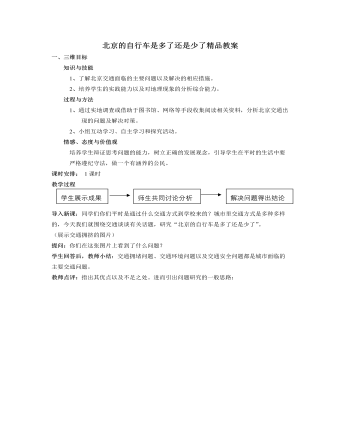
人教版高中地理必修2北京的自行车是多了还是少了精品教案
提问:城市环境污染源主要有哪些?有些同学基本同意自行车多是加剧南京空气污染的间接原因,你同意他们的观点吗?在学生回答的基础上,教师进行归纳小结:工业和交通是城市环境的主要污染源。而自行车是一种绿色交通工具,既环保又经济。只有当它在某些机动车和非机动车不分的地段,影响车辆行驶速度的时候,它才可能成为加剧空气污染的间接原因。问:那我们针对交通工具对环境造成的影响,有什么解决方法吗?归纳小结:? 实施减少汽车尾气污染的技术措施? 加强道路绿化? 合理规划城市道路,提高车速? 制定相关法规严禁各种车辆违规鸣喇叭? 在噪音严重的地区设置先进的隔音设施总结:通过前面的分析我们知道了自行车过多并不是造成北京交通拥挤的主要原因,但自行车多并且不遵守交通规则的确是造成交通拥堵的一个原因。从这方面来讲,在一些混合车道地段,自行车是造成空气污染加剧的间接原因。那么在北京到底是应该鼓励自行车的发展还是限制自行车的发展呢?
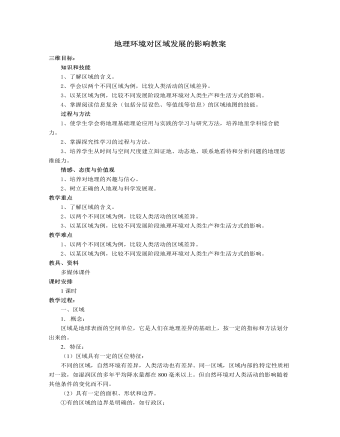
人教版高中地理必修3地理环境对区域发展的影响教案
(1)下面列出的是我国南北方传统民居的差异,分析形成这些差异的自然原因:——北方民居正南正北的方位观比南方强;——北方民居的墙体严实厚重,南方民居的墙体轻薄;——从北到南,民居的屋顶坡度逐渐增大,房檐逐渐加宽,房屋进深和高度逐渐加大。(2)下面列出的是我国南北方城市住宅搂的差异,分析导致这些差异的自然原因:——如果不考虑地价、建筑材料等因素,建同等面积的住房,北方的建筑成本比南方高 ;——建同样高度的多幢楼房,北方楼房的南北间距比南方大。点拨:本活动要求学生了解由于地理环境的差异造成南北方建筑物特点的不同,并由此认识地理环境 差异对人们生活的影响。(1)比较而言,北方的冬季寒冷而漫长,南方的夏季湿热而漫长。为了在冬季充分利用太阳光照和热量,北方民居正南正北的方位观比南方强。北方民居的墙体严实厚重,利用在冬季保温御寒;南方民居的墙体轻薄,利于在夏季通风透气。从北到南,年降水量逐渐增大,民居的屋顶坡度也逐渐增大(利于排水) ;随着对保温要求的降低和对通风纳凉要求的提高,民居的屋檐逐渐加宽,房屋进深和高度逐渐加大。
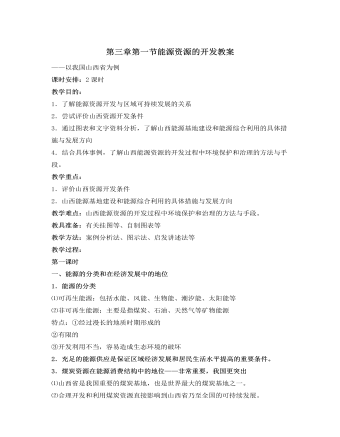
人教版高中地理必修3第三章第一节能源资源的开发教案
山西省总结出了许多重点工矿区的生态环境建设模式,即围绕煤田的露天开采区、居民点和主要交通线建设区,通过工程及生物措施,结合土地的复垦,充分利用厂矿的人力、财力和科技优势,建立集约经营的高效蔬菜、水果及肉蛋奶生产基地(图3.13)。1.说一说图中各种工程及生物措施的作用。点拨:参考图3.13图中各工程及措施的作用:(1)隔离护坝:主要作用是将采掘区与河流隔开,以免河水流入采掘区。(2)排水沟:主要作用是引开可能进入采掘区的雨水或其他水源。(3)公路紧靠采掘区,方便运输车辆就近从工地上公路。(4)“固沙草方格”,即在流沙表面用麦草、稻草扎成1×1米的草方格,使流沙不易被风 吹起,达到阻沙、固沙的目的,并在草方格上栽种沙蒿、花棒、籽蒿、拧条等沙生植物,建立起旱生植物带,营造挡沙树林。
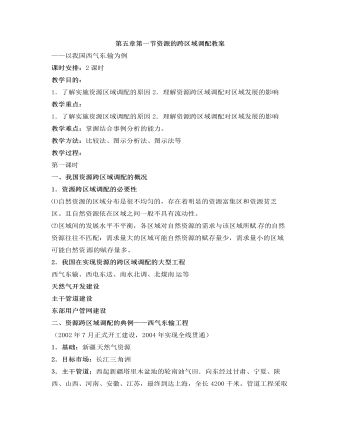
人教版高中地理必修3第五章第一节资源的跨区域调配教案
2.通过西气东输输送到上海的天然气,价格只相当于进口天然气的3/4、同等热值煤气的 2/3。你认为是否应该提高天然气的价格,以促进西部的发展。点拨:可以从不同方面分析。⑷对环境的影响①有利于改善东部地区的大气质量据监测显示,在同等热值的情况下,与煤炭相比,利用天然气作燃料几乎不产生二氧化硫、粉尘等污染物质,氮氧化物和二氧化碳的排放量也大为减少。长江三角洲地区的能源长期高度依赖煤炭,例如,上海市煤炭消费量占能源消费总量的70%。从西部地区输送来的天然气,可以部分替代煤炭。②为了最大限度减少对沿线地区生态环境的影响,西气东输工程在建设过程中,严格环境保护的要求。③在沿线农村地区推广使用天然气,可减少农民对薪柴的需求,从而缓解因植被破坏而带来的环境压力。
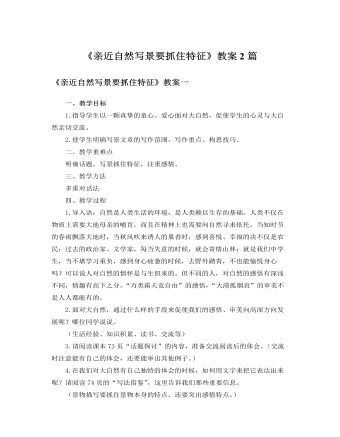
人教版高中语文必修2《亲近自然写景要抓住特征》教案2篇
一、教学目标1.指导学生以一颗真挚的童心、爱心面对大自然,促使学生的心灵与大自然亲切交流。2.使学生明确写景文章的写作范围、写作重点、构思技巧。二、教学重难点明确话题,写景抓住特征,注重感情。三、教学方法多重对话法四、教学过程1.导入语:自然是人类生活的环境,是人类赖以生存的基础。人类不仅在物质上需要大地母亲的哺育,而且在精神上也需要向自然寻求依托。当知时节的春雨飘落大地时,当秋风吹来诱人的果香时,感到喜悦、幸福的决不仅是农民;过去的政治家、文学家,每当失意的时候,就会寄情山林;就是我们中学生,当不堪学习重负,感到身心疲惫的时候,去野外踏青,不也能愉悦身心吗?可以说人对自然的情怀是与生俱来的。但不同的人,对自然的感悟有深浅不同,情趣有高下之分。“万类霜天竞自由”的感悟,“大漠孤烟直”的审美不是人人都能有的。2.面对大自然,通过什么样的手段来促使我们的感悟、审美向高深方向发展呢?哪位同学说说。
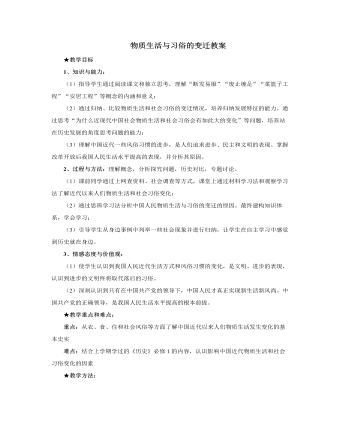
人教版高中历史必修2物质生活与习俗的变迁教案
★教学总结:(1)我国衣着服饰变化的三大阶段第一阶段(鸦片战争后到新中国的建立):这一阶段的阶段特征为中式与西式、传统和现代服饰并存男装:长袍马褂、西装、中山装 女装:旗袍(新式与旧式)第二阶段(新中国建立后到十一届三中全会):这一时期由于政治上的影响,阶段特征为衣着朴素,与革命相关的服饰成为主流男装:列宁装、中山装、绿军装女装:列宁装、布拉基、绿军装第三阶段(十一届三中全会后):阶段特征为与世界接轨,异彩纷呈;具体表现在,服饰由最基本的防寒保暖向美观大方转变,各种款式的服装层出不穷现在的服装是色彩鲜艳、款式多样,什么牛仔服、休闲服、西装、T恤衫、晚礼服,真是不胜枚举。每年服装的流行色、流行款式不断改变,大街上的姑娘和小伙子永远领导着时装新潮流。模特表演、模特广告和模特大赛已成为人们穿着方面不可缺少的内容。

新人教版高中英语必修3Unit 2 Morals and Virtues-Listening &Speaking&Talking教学设计
Example:One day, a poor boy who was trying to pay his way through school by sending newspapers door to door found that he only had one dime(一角)left. He was so hungry that he decided to beg for a meal at the next house.However, he lost his nerve when a lovely young woman opened the door. Instead of a meal he asked for a drink of water. She thought he looked hungry so she brought him a large glass of milk. He drank it slowly, and then asked, “How much do I owe you?” “You don’t owe me anything,” she replied, “Mother has taught me never to accept pay for a kindness.” “Then I thank you from the bottom of my heart.” With these words, Howard Kelly left that house.Years later the woman became badly ill and was finally sent to the hospital in a big city. Dr. Howard Kelly, now famous, was called in. When he heard the name of the town she came from, a strange light filled his eyes. Dressed in his doctor’s clothes, Dr. Kelly went into her room and recognized her at once. From that day on, he gave special attention to her, and decided to do his best to save her life.At last the woman was saved. Dr. Kelly asked the business office to pass the final bill to him. He looked at it and then wrote something on the side. The bill was sent to the woman’s room. She was afraid to open it because she was sure that it would take the rest of her life to pay for it off. Finally she looked, and the note on the side of the bill caught her attention. She read these words: “Paid in full with a glass of milk, Dr. Howard Kelly.” Tear of joy flooded her eyes.

新人教版高中英语必修3Unit 3 Diverse Cultures-Reading for Writing教学设计
The topic of this part is “Describe a place with distinctive cultural identity”.This section focuses on Chinese culture by introducing Chinatown, whose purpose is to show the relationship between the Chinese culture and American culture. The Chinese culture in Chinatown is an important part of American culture. Chinatown is an important window of spreading Chinese culture and the spirit homeland of oversea Chinese, where foreigners can experience Chinese culture by themselves.Concretely, the title is “Welcome to Chinatown!”, from which we can know that the article aims at introducing Chinatown. The author used the “Introduction--Body Paragraph--Conclusion” to describe the people, language, architecture, business, famous food and drinks and people’s activities, which can be a centre for Chinese culture and shows its unique charm.1. Read quickly to get main idea; read carefully to get the detailed information.2. Learn the characteristics of writing and language.3. Learn to introduce your own town according to the text.4. Learn to correct others’ writing.1. Learn the characteristics of writing and language.2. Learn to introduce your own town according to the text.Step 1 Lead in ---Small talkIn the reading part, we mentioned the Chinatown of San Francisco. How much do you know about Chinatown of San Francisco ?Chinatown is a main living place for Chinese immigrants, where you can see many Chinese-style buildings, costumes, operas, restaurants, music and even hear Chinese.Step 2 Before reading ---Predict the contentWhat is the writer’s purpose of writing this text ? How do you know ?From the title(Welcome to Chinatown) and some key words from the text(tourist, visit, visitors, experience), we can know the purpose of the text is to introduce Chinatown and show the relationship between Chinese culture and American culture.
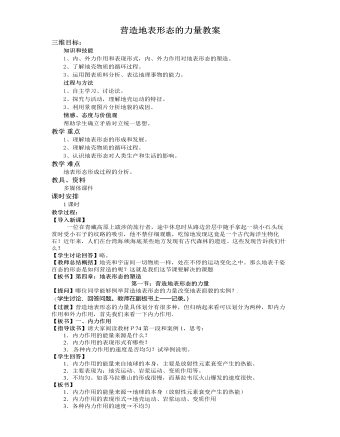
人教版高中地理必修1营造地表形态的力量教案
【导入新课】一位在青藏高原上跋涉的旅行者,途中休息时从路边岩层中随手拿起一块小石 头玩赏时受小石子的纹路的吸引,他不禁仔细观瞧,吃惊地发现这竟是一个古代海洋生物化石!近年来,人们在台湾海 峡海底某些地方发现有古代森林的遗迹。这些发现告诉我们什么? 【学生讨论回答】略。 【教师总结概括】地壳和宇宙间一切物质一样,处在不停的运动变化之中。那么地表千姿百态的形态是如何营造的呢?这就是我们这节课要解决的课题【板书】第四章:地表形态的塑造 第一节:营造地表形态的力量【提问】哪位同学能够例举营造地表形态的力量改变地表面貌的实例? (学生讨论、回答问题。教师在副板书上一一记录。) 【过渡】营造地表形态的力量具体划分有很多种,但归纳起来看可以划分为两种,即内力作用和外力作用,首先我们来看一下内力作用.【板书】一、内力作用 【指导读书】请大家阅读教材P74第一段和案例1,思考:

